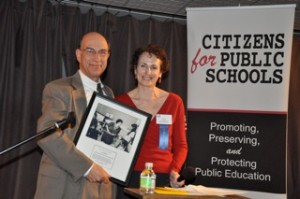
Richard Rothstein accepts Activist for Public Schools Award from CPS's Lisa Guisbond. (Photo by Larry Aaronson)
No sooner did Richard Rothstein graciously accept his Activist for Public Schools Award from CPS than he challenged CPS members and other progressive reformers to rethink issues of educational equity and the “achievement gap.” Demonstrating his adherence to evidence, he passed out a chart showing huge gains in math scores for Massachusetts black 4th and 8th graders between 1992 and 2009. The evidence, he said, does not support the idea that our schools have utterly failed black students. On the contrary, they have made such great gains in math on the National Assessment of Educational Progress, or NAEP, that they essentially closed the gap that existed between them and white and students in 1992. The gap persists because whites have also made gains during that time.
Rothstein’s point was not that school quality doesn’t matter, nor that we cannot improve schools for black students, but that if reform activists buy into the idea that schools alone can make up for larger social inequities and close the “achievement gap,” we are buying what amounts to a losing battle for teachers and schools. We are also neglecting to focus on the real problem, he said, the broader social inequities that leave too many children unprepared to learn and grow once they arrive at school. Society would do better to address the inequities affecting students before they even arrive at school than keeping beating up teachers and schools for perpetuating or not eliminating achievement gaps.
Rothstein addressed a full and attentive audience at the Church on the Hill and drew a range of questions and comments. Barbara Fields, who formerly headed the Office of Equity in the Boston Public Schools for 24 years, challenged the notion that the achievement gap couldn’t be closed or even eliminated by investment and improvement in urban public schools. Click here to read more.
Click here to watch video of the meeting and Richard Rothstein’s talk.

